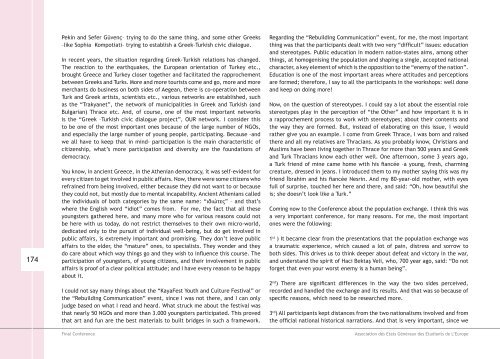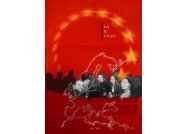turkish-greek civic dialogue - AEGEE Europe
turkish-greek civic dialogue - AEGEE Europe
turkish-greek civic dialogue - AEGEE Europe
Create successful ePaper yourself
Turn your PDF publications into a flip-book with our unique Google optimized e-Paper software.
174<br />
Pekin and Sefer Güvenç– trying to do the same thing, and some other Greeks<br />
–like Sophia Kompotiati– trying to establish a Greek–Turkish <strong>civic</strong> <strong>dialogue</strong>.<br />
In recent years, the situation regarding Greek-Turkish relations has changed.<br />
The reaction to the earthquakes, the <strong>Europe</strong>an orientation of Turkey etc.,<br />
brought Greece and Turkey closer together and facilitated the rapprochement<br />
between Greeks and Turks. More and more tourists come and go, more and more<br />
merchants do business on both sides of Aegean, there is co-operation between<br />
Turk and Greek artists, scientists etc., various networks are established, such<br />
as the “Trakyanet”, the network of municipalities in Greek and Turkish (and<br />
Bulgarian) Thrace etc. And, of course, one of the most important networks<br />
is the “Greek –Turkish <strong>civic</strong> <strong>dialogue</strong> project”, OUR network. I consider this<br />
to be one of the most important ones because of the large number of NGOs,<br />
and especially the large number of young people, participating. Because -and<br />
we all have to keep that in mind- participation is the main characteristic of<br />
citizenship, what’s more participation and diversity are the foundations of<br />
democracy.<br />
You know, in ancient Greece, in the Athenian democracy, it was self-evident for<br />
every citizen to get involved in public affairs. Now, there were some citizens who<br />
refrained from being involved, either because they did not want to or because<br />
they could not, but mostly due to mental incapability. Ancient Athenians called<br />
the individuals of both categories by the same name: “ιδιώτες” – and that’s<br />
where the English word “idiot” comes from. For me, the fact that all these<br />
youngsters gathered here, and many more who for various reasons could not<br />
be here with us today, do not restrict themselves to their own micro-world,<br />
dedicated only to the pursuit of individual well-being, but do get involved in<br />
public affairs, is extremely important and promising. They don’t leave public<br />
affairs to the elder, the “mature” ones, to specialists. They wonder and they<br />
do care about which way things go and they wish to influence this course. The<br />
participation of youngsters, of young citizens, and their involvement in public<br />
affairs is proof of a clear political attitude; and I have every reason to be happy<br />
about it.<br />
I could not say many things about the “KayaFest Youth and Culture Festival” or<br />
the “Rebuilding Communication” event, since I was not there, and I can only<br />
judge based on what I read and heard. What struck me about the festival was<br />
that nearly 50 NGOs and more than 3.000 youngsters participated. This proved<br />
that art and fun are the best materials to built bridges in such a framework.<br />
Regarding the “Rebuilding Communication” event, for me, the most important<br />
thing was that the participants dealt with two very “difficult” issues: education<br />
and stereotypes. Public education in modern nation-states aims, among other<br />
things, at homogenising the population and shaping a single, accepted national<br />
character, a key element of which is the opposition to the “enemy of the nation”.<br />
Education is one of the most important areas where attitudes and perceptions<br />
are formed; therefore, I say to all the participants in the workshops: well done<br />
and keep on doing more!<br />
Now, on the question of stereotypes. I could say a lot about the essential role<br />
stereotypes play in the perception of “the Other” and how important it is in<br />
a rapprochement process to work with stereotypes; about their contents and<br />
the way they are formed. But, instead of elaborating on this issue, I would<br />
rather give you an example. I come from Greek Thrace, I was born and raised<br />
there and all my relatives are Thracians. As you probably know, Christians and<br />
Muslims have been living together in Thrace for more than 500 years and Greek<br />
and Turk Thracians know each other well. One afternoon, some 3 years ago,<br />
a Turk friend of mine came home with his fiancée –a young, fresh, charming<br />
creature, dressed in jeans. I introduced them to my mother saying this was my<br />
friend İbrahim and his fiancée Nesrin. And my 80-year-old mother, with eyes<br />
full of surprise, touched her here and there, and said: “Oh, how beautiful she<br />
is; she doesn’t look like a Turk.”<br />
Coming now to the Conference about the population exchange. I think this was<br />
a very important conference, for many reasons. For me, the most important<br />
ones were the following:<br />
1 st ) It became clear from the presentations that the population exchange was<br />
a traumatic experience, which caused a lot of pain, distress and sorrow to<br />
both sides. This drives us to think deeper about defeat and victory in the war,<br />
and understand the spirit of Haci Bektaş Veli, who, 700 year ago, said: “Do not<br />
forget that even your worst enemy is a human being”.<br />
2 nd ) There are significant differences in the way the two sides perceived,<br />
recorded and handled the exchange and its results. And that was so because of<br />
specific reasons, which need to be researched more.<br />
3 rd ) All participants kept distances from the two nationalisms involved and from<br />
the official national historical narrations. And that is very important, since we<br />
Final Conference Association des Etats Généraux des Etudiants de L’<strong>Europe</strong>







